UBC Indigenous scholars have created an installation in the Irving K. Barber Learning Centre that celebrates Aboriginal scholarship, creativity, and intellectual traditions. The installation, featuring six different exhibit cases, is part of the Library’s second annual Aboriginal (Un)History Month.
Aboriginal (Un)History Month introduces ways UBC Indigenous scholars are bridging communities and transforming academic spaces through Indigenous approaches to research. It aims to educate and invite dialogue about (inter)relationships between place, recognition and memory.
Place, Belonging and Promise: Indigenizing the International Academy?
Dr. Shelly Johnson (Mukwa Musayett), UBC School of Social Work – Vancouver Campus, offers questions for visitors to reflect upon relating to issues that Indigenous scholars face every day at the University. One space for discussion is the Idle No More movement, and its impact on the UBC campus. In making places and spaces on unceded traditional Musqueam territory for Indigenous voices to be heard, Being Idle No More generates enquiry about principles of legal sovereignty, cultural self-determination, activism, rights and reconciliation. It asks, “What does it mean to be an Indigenous faculty or staff member or student at UBC?” and “How do diverse Indigenous worldviews, political, social, historic and economic experiences, and ways of knowing, differ from non-Indigenous.”
Being Well Being: The Institute for Aboriginal Health’s Teaching and Learning Garden
Dr. Teresa Howell, Research Manager at the Institute for Aboriginal Health (IAH), presents food as medicines. The IAH has developed a community training and research garden plot in partnership with the UBC Farm and the Faculty of Land and Food Systems. In place since 2006, this plot serves many educational and research purposes such as, providing produce and teas for the Feast Bowl community meal; regular medicine walks with elders and other knowledge-keepers; Culturally Relevant Urban Wellness youth; and indigenous food security and access to traditional plants through a living germplasm and knowledge database about managing native flora and some of our native perennials.
Hands Back … Hands Forward: Year of Indigenous Education
Curated by Aurelia A.K. Kinslow and Dr. Jo-Ann Archibald, The Year of Indigenous Education brings students, community members, faculty, teachers, and leaders together to explore and celebrate issues related to Indigenous Education. “The Year of” activities began with the inaugural Musqueam Excellence in Education Lecture, and continues until the end of August 2013 with seminars, activities, and special events celebrating Indigenous research and Aboriginal Engagement. The initiative creates a legacy of Indigenous Education resources and networks for educators and learners. In the next event, Guiding Circles Career Development Program, UBC authors Drs. Rod McCormick and Norm Amundson will discuss an interactive career development program on June 18 2013 4pm-5:30pm at Sty’wet’tan Hall, UBC FIrst Nations Longhouse.
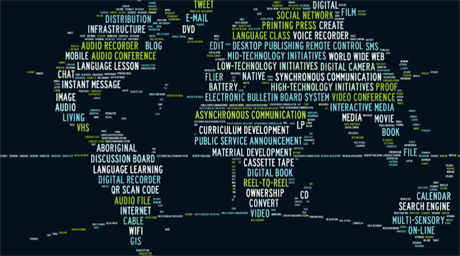
Living Our Indigenous Languages
Dr. Candace Kaleimamoowahinekapu Galla, UBC Department of Language & Literacy Education, presents a grant-funded project to develop a new multimedia website, Enhancing Indigenous Language and Culture Education Across the Curriculum: Engagement of Students and Faculty through Multimedia Technology. Students frequently have competency in various world and heritage languages, but often are unaware of the language diversity of First Nations communities across British Columbia. As a result, discussions in the classroom regarding Indigenous languages, rarely move beyond an introductory level. This multimedia website will provide Indigenous and non-Indigenous students, instructors, researchers and the broader public with a starting point to their investigations of issues relevant to Indigenous languages both locally and internationally. @candacekgalla
Truth and Reconciliation in Canada
Amy Perreault, Strategist of Aboriginal Initiatives at the Centre for Teaching and Learning Technology, presents information about The Truth and Reconciliation Commission (TRC) of Canada. The TRC will be conducting the last of its National Events to be held on the west coast in Vancouver (Sept 18-21, 2013). UBC has taken the extraordinary step of suspending classes on September 18th so that students, faculty, and other members of the UBC community might more fully participate in the Commission’s west coast National Events. Many initiatives are underway on campus to prepare for our participation in this event.
Learn more about UBC and the TRC and share what you are doing on the IRSI website.
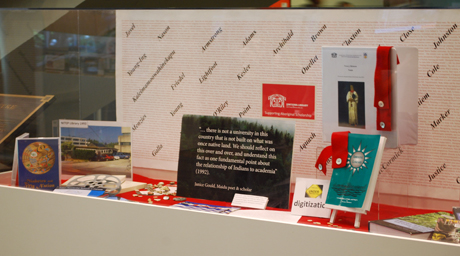
Raven in the Library @ Xwi7xwa
Tsimshian artist Glen Wood’s eloquent First Nations House of Learning logo is composed of a human face surrounded by two ravens which form the frame of a longhouse. The longhouse represents the university or a “House of Learning,” and Raven a symbol of creativity and learning is also known as a trickster or transformer. The logo tells a story of Raven transforming the university to reflect First Nations cultures and philosophies. At Xwi7xwa Library, Raven does her work through unique multidisciplinary Indigenous collections, services informed by Indigenous theories and pedagogies, and programs celebrating Indigenous intellectual traditions and contemporary scholarship.
Check out the UBC Aboriginal Scholars’ publications database, and UBC courses with Indigenous content at Xwi7xwa Library.
For more information on the Aboriginal (Un)History Month activities, or to see case labels, visit the “Aboriginal (Un)History Month at UBC Library” blog post.
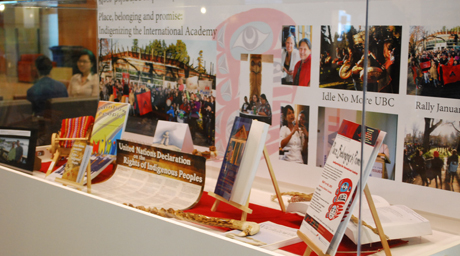
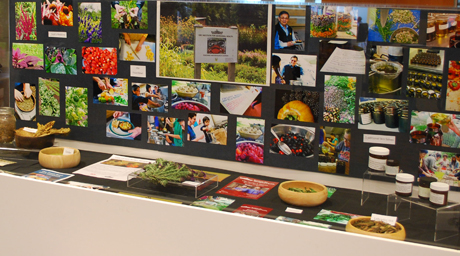

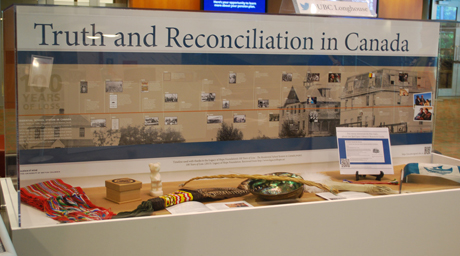
Thank you for the resources!